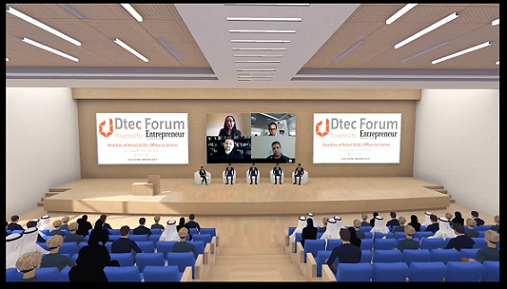 Dubai Silicon Oasis Authority (DSOA), the regulatory body for Dubai Silicon Oasis (DSO), the integrated free zone technology park, recently held the 38th edition of the quarterly Dubai Technology Entrepreneur Campus (Dtec) Forum, powered by Entrepreneur ME, titled ‘Realities of Retail in 2020: Offline to Online’.
Dubai Silicon Oasis Authority (DSOA), the regulatory body for Dubai Silicon Oasis (DSO), the integrated free zone technology park, recently held the 38th edition of the quarterly Dubai Technology Entrepreneur Campus (Dtec) Forum, powered by Entrepreneur ME, titled ‘Realities of Retail in 2020: Offline to Online’.
Kicking off the last Dtec Forum for 2020 and welcoming participants, Hans Christensen, Vice President of Dtec, said: “Every Dtec Forum edition focuses on a trending topic and tackles issues that are affecting technology and entrepreneurship industries. We aim to explore, educate, and provoke discussions that pave the way for knowledge exchange and potentially yield collaborations beyond the forum. The year 2020 has been challenging for everyone across the globe, and crucial for the e-commerce industry in the MENA region. Retailers have had to completely rethink their reliance on physical outlets and shift to online platforms, as well as delivery modules, which has unveiled substantial data-driven insights that led to new business strategies.”
Highlighting the technology used for this quarter’s Dtec Forum, Hans said: “This event has taking a slightly different format than usual. We have worked closely with a Dtec-based company, Outreal XR, to utilize their Holofair platform, testament to the innovation of startups at Dtec and our support for DSO’s business community.”
Edward Sabbagh, Managing Director of Farfetch in the Middle East, headlined the Dtec Forum in a one-on-one talk titled ‘Digitizing the Luxury Experience’. He noted that many changes disrupted the industry, with fashion brands reevaluating their whole supply chain. However, he highlighted the shift from offline to online as the key change that shifted the retail landscape.
He said: “Research from 2019 showed that brick-and-mortar retail shops account for 88 percent of luxury retail sales globally, and online sales accounting for the remainder 12 percent, but it still estimated that online sales will grow to 25 percent by 2025. These estimates have now been revised, and online sales are expected to grow to 30 percent by 2025. Growth of sales through online channels was always predominant in the growth factor of the whole sector, as compared to offline sales. Hence, it is no surprise for the growth witnessed during the coronavirus pandemic, but it was definitely an acceleration. In 2020, online sales in the personal luxury goods industry is estimated to have grown to 23 percent, almost two-fold.”
Sabbagh highlighted that although sale transactions may conclude offline, the customer’s purchase journey is not exclusively offline – customers can browse products online and complete the purchase offline, and vice-versa. Therefore, a brand’s online presence, whether through a website or social media channels, is a must.
The Dtec Forum then hosted a panel discussion, titled ‘Offline to Online – Taking Advantage of the E-Commerce Boom’, moderated by Tamara Pupic at Entrepreneur ME. Panelists Khalil Alami, CEO of Telr, Rayan Osseiran, Founder of Shorages, and Renaud de Gonfreville, CEO of Ziwo, outlined the opportunities that the rapid growth of e-commerce, due to the COVID-19 pandemic, has brought to the sector.
Alami said: “COVID-19 has had a very heartbreaking impact on humanity, economies, and societies, from different aspects. On the other hand, it had a stimulant effect on the digitalization of industries, such as fintech and e-commerce. Customer behavior shifted significantly, where people were trying to balance between staying safe and fulfilling their responsibilities and providing necessities. Hence, retailers had to immediately adapt to meet customer demand and maintain business.”
Osseiran stressed: “Since 2017, we’ve traditionally seen e-commerce sales in the MENA region at around three to four percent in terms of penetration. That was largely due to brands’ unavailability online, as well as customers’ use of online shopping platforms. Essentially, what COVID-19 did was shatter these reasons by pushing brands and customers online. March 2020 was just a glimpse into what was to come with regards to e-commerce sales and market penetration.”
For his part, Renaud highlighted that 60 percent of Ziwo’s employees were home-based, so going to fully working from home was not an issue. Most of their clients, though, were not prepared and it was dramatic.


